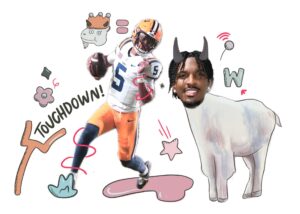Everyone loves a breakout rookie. The NFL is full of them, players who come out of nowhere, light up highlight reels, and make you believe in miracles (or at least in your fantasy team). Think C.J. Stroud: carving up defenses in his first year, passing for over 4,000 yards, and making the Houston Texans look like a playoff team. But then, year two hits. The adrenaline fades, defenses have studied their film, and reporters start asking if they’ve regressed. They start overthinking plays that came naturally before. Football analysts refer to this trend as the infamous “sophomore slump.”
However, college students know all too well that the sophomore slump doesn’t just happen to professional athletes. It’s a phenomenon that affects us just as much. The first year feels surreal, meeting new people every day, exploring campus, and staying up until 2 a.m. for no reason. You feel unstoppable, like Joe Burrow in his rookie season before the ACL tear. Then, sophomore year comes, and suddenly you’re running a tougher schedule, your classmates are talking about their summer internships, and the magic of Leo’s just isn’t the same anymore. Sophomore year, much like the second season in the NFL, humbles you.
In the NFL, a slump can be spotted from miles away. Take Baker Mayfield’s 2019 season. After looking like the Cleveland Browns’ savior as a rookie quarterback, he came crashing down to Earth the next year with interceptions, overthrown passes, and an alarming number of commercials for somebody who couldn’t win any games. The pressure of high expectations crushed the fun out of his game. Sound familiar?
Last year, Jayden Daniels was living the NFL version of our first-year high. He put on a show in Washington with his dual-threat ability, turning Commanders games into must-watch TV. The city, as many Georgetown students know, was buzzing, and fans grew hopeful. Every highlight looked effortless.
This year, though, defenses are adapting to his style of play. He’s facing tougher reads, tighter coverage, and the weight of Offensive Rookie of the Year rests on his shoulders. So far, he’s battled injuries and the age-old question: “Can he adjust?” Already, the Commanders are off to a slower start than last year, and some fans are worried that he was just a one-hit wonder.
Students wonder the same thing about themselves. As a sophomore myself, I see my friends on daily calls and coffee chats, and the term “networking” has become a norm in my life. I’m not new anymore. While I no longer get lost on campus, the charm of “finding myself” has been replaced by pressure to figure out my future. The window to select a major is closing in, and I am starting to compare myself to others like I check stats on ESPN, each new LinkedIn connection like an added fantasy point.
You start wondering if you’re behind, even though you’re exactly where you’re supposed to be.
But here’s the thing: slumps aren’t permanent. Lots of players persevere and come back better. Josh Allen had a second season where critics questioned if he could throw accurately at all. He spent the offseason refining his fundamentals and turned into one of the league’s most elite quarterbacks.
Trevor Lawrence looked lost under head coach Urban Meyer (which, honestly, who wouldn’t?). Once he got a better coach, he became a playoff-caliber quarterback. What separates these players from those who stay slumped isn’t luck, but reflection. They didn’t try to recreate their rookie success; they learned from what went wrong.
The sophomore slump doesn’t mean you peaked as a freshman. It does mean the honeymoon phase is over, allowing the real growth to begin. You can’t rely on the same basic tricks anymore. Start watching your game film. What worked last year? What didn’t? Maybe you need to take advantage of office hours, change how you study, or just admit you can’t do everything you did in your first year.
You don’t escape the sophomore slump by pretending it’s not happening; you overcome it by adjusting your playbook and not being afraid to scramble if it comes to it. When you inevitably fumble, because you will, just remember that it’s part of the process. The players who grow aren’t the ones who avoid mistakes; they’re the ones who learn from them. Most importantly, don’t underestimate the value of your support system. Every quarterback has a coach and an offensive line.
There’s also something freeing about realizing that the slump is normal. Every great player experienced a career slump. Patrick Mahomes had a midseason meltdown in 2021. Joe Burrow’s second year was full of growing pains before his breakout Super Bowl run. Even Tom Brady had a season people called underwhelming. Nobody dominates every down. Sophomore year is the start of the long game. You begin to realize that life, like football, is less about the 60-yard deep shot and more about the quiet adjustments you make in between each play.
Maybe this year you feel that you’ve lost your rookie flair. You’re not washed, you’re just human. You’re in your development phase and that’s where the real work happens. Growth doesn’t always look pretty—sometimes it looks like late nights, self-doubt, and trying again anyway. The sophomore slump isn’t the end of the story; it’s the middle.
If the NFL has taught us anything, it’s that comebacks make the best stories. Keep showing up and learning from the tape. When the spotlight dims, that’s when real players learn how to shine. Even if it all goes sideways, at least you’re not on the Jets.






